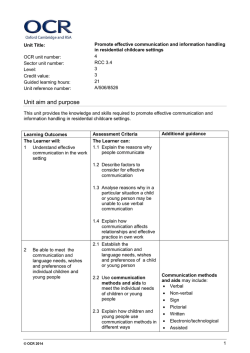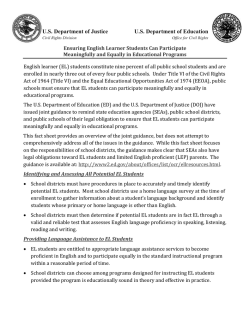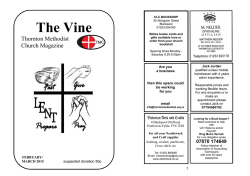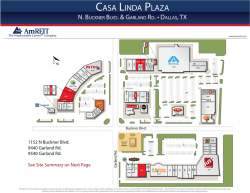
June 2015
June 2015 AS GCE APPLIED BUSINESS F246/SM Financial Providers and Products STIMULUS MATERIAL SERIES 10 * 4 9 9 6 3 4 2 9 9 1 * It is intended that this stimulus material is used for the June 2015 examination session. OCR supplied materials: None Other materials required: • A calculator may be used * F 2 4 6 S M * INSTRUCTIONS TO TEACHERS • • • • • • This stimulus material provides a vocational context for the internally assessed unit: F246 – Financial Providers and Products. Each year one scenario will be released on OCR’s website which will provide an authentic vocational context for candidates’ subsequent investigations. Although it is intended that this stimulus material is used for the June 2015 examination session, there is no shelf life for this OCR generated stimulus material. If you wish to generate your own stimulus material for this portfolio unit, please ensure it is fit for purpose and adheres closely to the guidelines laid down in the unit specification. There are no separate marking criteria with this stimulus material. Once the candidate has produced their financial package, they must then consider its effectiveness, given a change in the future circumstances of their customer. At this point you must provide additional guidance on what these future changes could be, referring to the unit specification as a source of further information. INFORMATION FOR CANDIDATES • • • • This stimulus material has been created to provide you with a vocational context for the internally assessed unit: F246 – Financial Providers and Products. If you have any questions regarding the stimulus material, you must consult both your teacher and the unit specification. Once your financial package has been generated you must then consider its effectiveness, given a change in future circumstances to your customer. At this point, you will be provided with additional guidance from your teacher to allow you to carry out this evaluative task. This document consists of 4 pages. Any blank pages are indicated. A calculator may be used for this paper © OCR 2015 [T/102/8212] DC (ST) 93635/1 OCR is an exempt Charity Turn over 2 Going Mobile History After qualifying as a hairdresser seven years ago, Joshua had been determined that one day he would run his own salon. In order to realise his dream he had spent the first three years of his career gaining experience working in different salons where he cut and styled both women’s and men’s hair. During this time he developed a passion for designing new hair styles for the fashion conscious man. Joshua felt men were beginning to have a much greater understanding that being in fashion also involved looking after their hair. He was convinced that there was a niche market waiting to be tapped into. Eventually he would create his own ‘distinguished salon’ in order to meet the needs of this market. 5 Realisation of the dream In late 2009, Joshua, aged 27, found suitable premises to rent which included a two bedroom flat. The rent for the shop would be £14 400 per annum and for the flat the rent would be £800 per month. The premises had originally been a book shop and, therefore, needed extensive renovations to bring it up to the high and exacting standards of a modern hairdressing salon. In order to do this Joshua took out a business loan in April 2010 for £20 000 over 10 years. Repayments were set at £256 per month. His parents acted as guarantors for the loan, using their house as security. 10 15 Joshua started trading in August 2010 and slowly established the reputation of his business. By the end of his fourth year of trading the business had a turnover of approximately £78 000 with an estimated profit of £27 000. Joshua was quite happy with life – he had been able to meet the day-to-day payments for his salon and during year four he had taken drawings of £25 000. The current situation In August 2014 the landlord gave notice to Joshua that she had decided to undertake some external modernisation of the shop front, alongside internal modernisation of the flat. The result of this was that the rent of the shop and flat would be increased to £18 000 per annum and £1 200 per month respectively with effect from January 2015. Because of this increase in fixed costs from January 2015, Joshua has drawn up a detailed forecast income statement for year five which projects a reduction in profit to £19 700. He is aware that the reduction in profit will impact on the drawings he will be able to take from the business. With the rent on his flat rising to £1 200 per month Joshua has calculated that he would only be left with about £400 per month to pay his tax and National Insurance contributions, buy food and meet the rest of his personal expenses. Joshua has already been living above his means. He has an agreed bank overdraft of £1 000 which he often fully utilises, alongside an outstanding credit card bill of £3 500. 20 25 30 Joshua realises that he has to take action. He can no longer afford the rent charged on his salon and flat. The way forward Joshua has decided not to renew the lease on both the salon and the flat on the expiry of the current lease in spring 2015. He would then start up as a mobile hairdresser. He has estimated that he should be able to cover all the costs for the current business until the expiry of the lease. He is however concerned that he will have to take a second credit card up to its maximum limit of £3 000 in order to cover his personal living expenses over the coming months. © OCR 2015 F246/SM/SERIES 10 35 3 Before making this decision Joshua had undertaken some market research by talking to some of his regular customers. They all seemed keen to remain with him as long as Joshua was prepared to work evenings and weekends when they would be at home. Quite a few of his regular customers are employed at the headquarters of Zenuse Insurance. Some of these customers have asked Zenuse Insurance’s Personnel Officer if Joshua could come to the offices on a specific day of the week to set up a mini-salon. Zenuse Insurance has agreed that Joshua can set up the mini-salon within one of its meeting rooms one day a week. He has been given permission to operate from 8.30am to 6pm. Joshua thinks he will be able to raise £5 000 through the sale of excess equipment, fixtures and fittings from his current salon. This could either be used to pay off part of his £20 000 loan which still has about five years remaining, or to pay some of his personal debts, or used as start-up capital for the new mobile hairdressing venture. Joshua will need to obtain a vehicle in order to become a mobile hairdresser as he currently does not own a vehicle. He has looked on the Internet and found that he could purchase a second hand van for approximately £2 500. The alternative is to lease a van at a cost of approximately £170 per month, including VAT. 40 45 50 55 Joshua has started to put together a projected set of figures for his first year of trading as a mobile hairdresser (commencing spring 2015). Sales – mobile Sales – Zenuse Insurance Total sales Cost of sales Projected gross profit Less costs Room hire – Zenuse Insurance Motor expenses* Loan repayment Other costs Projected net profit £ 34 100 9 600 43 700 5 280 38 420 60 65 5 200 4 580 3 072 500 25 068 *This does not include rental charges if leasing a van. It only covers fuel, insurance and road tax. 70 Problem – Business Joshua wants to find out the best way to fund the start-up of his mobile hairdressing business. He will have all the equipment he needs from the closure of his salon. His main outgoing is the purchase or lease of a van. He also needs to continue to cover the repayments on his business loan. He would also like to better understand the type and cost of insurances which he will need once he has given up his salon premises and works on a mobile basis. 75 Problem – Personal Joshua has the problem of finding somewhere new to live. If his estimation is correct he will be able to afford a maximum of £800 per month for rent. Council Tax on flats will vary but Joshua estimates about £80 per month. Using the above estimated figures and with a little added caution, Joshua thinks he will be able to withdraw £20 000 per annum from his mobile business which should give him an income © OCR 2015 F246/SM/SERIES 10 80 Turn over 4 of approximately £1 670 per month before deductions. He estimates that utility bills will be approximately £100 per month. Joshua usually spends £120 per month on food. Joshua’s most pressing issue is how to rationalise his immediate personal debts. He already has a credit card debt of £3 500 and the real possibility of his bank overdraft being at its limit of £1 000, as well as, potentially, another credit card debt of £3 000. 85 In addition Joshua feels that in time it would be a good idea if he started saving towards the purchase of his own flat. He would like to know details of the different savings packages that are available. Copyright Information OCR is committed to seeking permission to reproduce all third-party content that it uses in its assessment materials. OCR has attempted to identify and contact all copyright holders whose work is used in this paper. To avoid the issue of disclosure of answer-related information to candidates, all copyright acknowledgements are reproduced in the OCR Copyright Acknowledgements Booklet. This is produced for each series of examinations and is freely available to download from our public website (www.ocr.org.uk) after the live examination series. If OCR has unwittingly failed to correctly acknowledge or clear any third-party content in this assessment material, OCR will be happy to correct its mistake at the earliest possible opportunity. For queries or further information please contact the Copyright Team, First Floor, 9 Hills Road, Cambridge CB2 1GE. OCR is part of the Cambridge Assessment Group; Cambridge Assessment is the brand name of University of Cambridge Local Examinations Syndicate (UCLES), which is itself a department of the University of Cambridge. © OCR 2015 F246/SM/SERIES 10
© Copyright 2026





